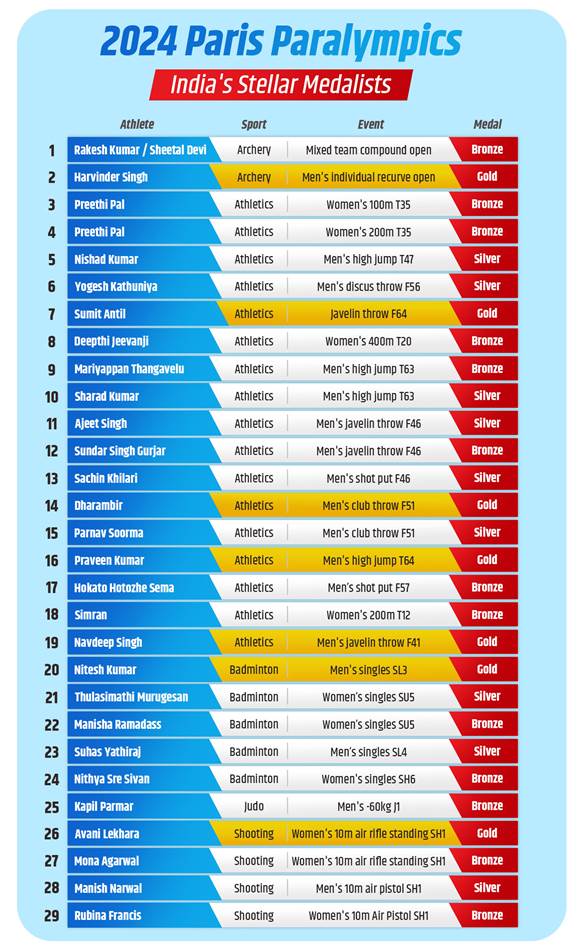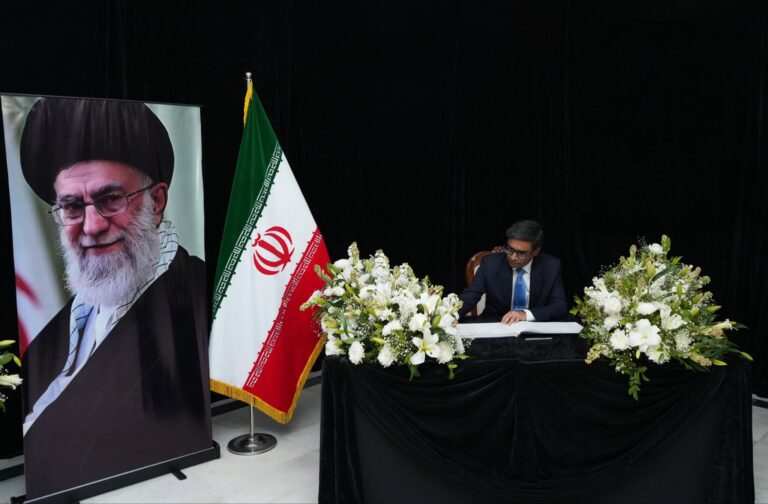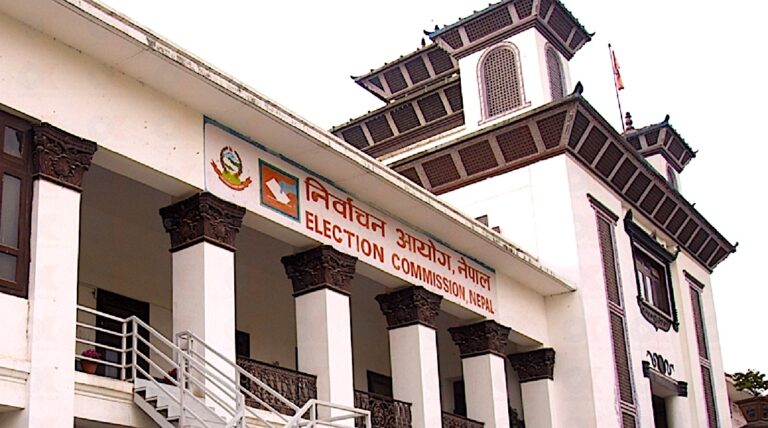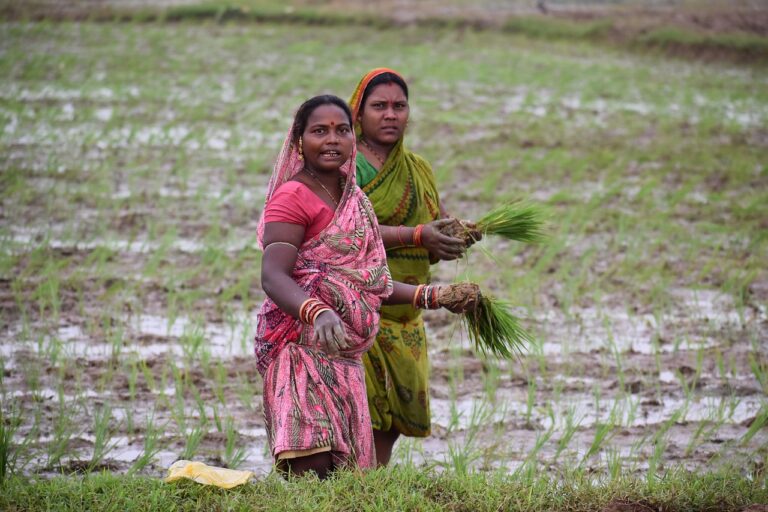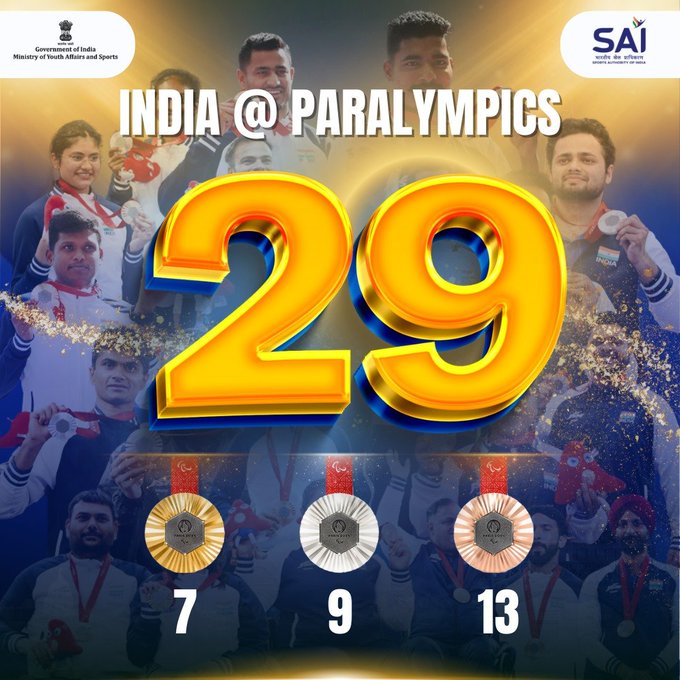
Paris: India’s Paralympic story this year in Paris has been a tale of inspiration and achievement. Indian participants’ performances ensured the Paris Paralympic Games 2024, the country’s most successful Paralympic campaign to date.
At the 2024 Paris Games, which concluded yesterday, Indian athletes secured a record-breaking 29 medals—7 gold, 9 silver, and 13 bronze.
The Paris 2024 Paralympic Games, held from August 28 to September 8, 2024, were a grand celebration of global athletic prowess and inclusivity. Featuring 4,400 athletes from around the world competing in 22 sports, the Games were hosted across some of Paris’s most iconic venues, including the Eiffel Tower, the Château de Versailles, and the Grand Palais.
For India, the 2024 Paris Paralympics marked the nation’s most successful Games to date. India’s participation reached new heights, with a record 84 athletes competing in 12 sports.
While India’s Olympic success was once dominated by its hockey team, the Paris Paralympics saw individual athletes rise to prominence, achieving remarkable feats and bringing glory to the nation.
India’s achievements at Paris 2024 underscored the progress made in the development and recognition of Paralympic sports within the country. The athletes’ outstanding performances highlighted India’s continued ascent in the Paralympic arena and set a new benchmark for future participation and success.
India’s para-athletes delivered their best-ever performance at the Paris Games, earning an incredible 29 medals—7 gold, 9 silver, and 13 bronze—securing an 18th-place finish in the overall medal tally. This achievement represents a watershed moment for Indian para-sports, showcasing the potential of Indian athletes on the global stage.
India’s medal haul at the 2024 Paris Paralympics was led by stellar performances from athletes across a range of disciplines. Avani Lekhara clinched gold in the Women’s 10m Air Rifle Standing SH1, while Nitesh Kumar dominated in badminton, winning gold in the Men’s Singles SL3. Sumit Antil and Dharambir added to the tally with golds in Men’s Javelin Throw F64 and Men’s Club Throw F51, respectively. Archery saw Harvinder Singh secure gold in the Men’s Individual Recurve Open, while Navdeep Singh triumphed in the Men’s Javelin Throw F41. Suhas Yathiraj brought home silver in the Men’s Singles SL4 badminton event, and Nishad Kumar earned silver in the Men’s High Jump T47. Rakesh Kumar and Sheetal Devi took bronze in Archery’s Mixed Team Compound Open, rounding off India’s historic campaign. Many more athletes contributed to the nation’s impressive medal count, making it a truly collective achievement for Indian para-sports.
Paris stands as a testament to India’s growth in this arena, highlighting the dedication, resilience, and extraordinary achievements of its para-athletes.
The Paris Paralympics has not only underscored India’s remarkable rise in para-sports but has also highlighted the broader evolution of the Paralympic movement itself. This achievement marks a new pinnacle in India’s Paralympic history, showcasing the nation’s growing prominence on the world stage. The 2024 Paris Paralympics will be remembered as a defining chapter in India’s sporting history, inspiring future generations of athletes and reaffirming the nation’s commitment to inclusive excellence in sports.
The origins of the Paralympics trace back to July 29, 1948, when Dr. Ludwig Guttmann organized the Stoke Mandeville Games—a groundbreaking event for wheelchair athletes. This modest competition, featuring just 16 injured servicemen and women in archery, set the stage for what would eventually become the Paralympic Games, creating a platform for athletes with disabilities to showcase their abilities on a global scale.
From these humble beginnings, the Paralympic movement evolved, with the first official Games held in Rome in 1960, featuring 400 athletes from 23 countries. Since then, both the Summer and Winter Paralympics have grown significantly, held every four years in the same cities as the Olympics, thanks to an agreement between the International Paralympic Committee (IPC) and the International Olympic Committee (IOC), which reflects the Games’ increasing prestige and global reach.
India’s Debut and Early Years at the Paralympics
India made its maiden appearance at the Paralympics in 1968 in Tel Aviv, Israel. A delegation of 10 athletes, consisting of eight men and two women, represented the country in this historic outing. Although India did not win any medals at the Games, it provided the first significant international exposure for the nation’s para-athletes, marking the beginning of India’s journey on the global Paralympic stage.
Four years later, at the 1972 Heidelberg Games in Germany, India achieved its first Paralympic success. Para-swimmer Murlikant Petkar made history by winning gold in the 50m freestyle swimming event, setting a world record time of 37.331 seconds. Despite this monumental achievement, Petkar’s gold remained India’s only medal at the Games, with the country finishing 24th in the overall medal standings out of 42 participating nations.
Following this landmark victory in 1972, India’s participation in the Paralympics faced interruptions, as the country did not take part in the 1976 and 1980 Games. It wasn’t until the 1984 Games that India returned to the Paralympic arena. This edition was a significant one, as India secured four medals—Two silvers and two bronzes. Bhimrao Kesarkar won silver in Men’s Javelin Throw L6, while Joginder Singh Bedi claimed silver in Men’s Shot Put L6, along with two bronze medals in Men’s Javelin Throw L6 and Men’s Discus Throw L6.
India’s next Paralympic success came 20 years later at the 2004 Athens Games. Devendra Jhajharia won gold in Men’s Javelin Throw F44/46, and Rajinder Singh Rahelu earned a bronze in Men’s Powerlifting 56 kg, taking India’s total tally to two medals in that edition.
Era of Transformation (2012-2020)
The period from 2012 to 2020 marked a transformative chapter in India’s Paralympic history, witnessing unparalleled growth in both performance and global recognition. Beginning with Girisha N Gowda’s lone silver medal at the 2012 London Paralympics, followed by a four-medal haul at the 2016 Rio Paralympics, and culminating in India’s impressive 19-medal success at the 2020 Tokyo Paralympics, this era highlighted the unwavering dedication and immense talent of Indian para-athletes. Their achievements on the world stage not only elevated India’s standing in the Paralympic arena but also inspired millions by breaking barriers and rewriting records.
2012 London Paralympics
At the 2012 London Paralympics, India secured its sole medal through the exceptional performance of Girisha N Gowda. Competing in the Men’s High Jump F42 category, Gowda won a silver medal, marking a significant achievement for Indian athletics. Despite a strong showing from the team, this was India’s only podium finish at these Games. Gowda’s accomplishment highlighted his outstanding athleticism and brought a moment of pride to the nation amidst the competitive global arena.
2016 Rio Paralympics
The 2016 Rio Paralympics were a landmark event for the Paralympic Movement, setting new standards in visibility and engagement with record-breaking TV audiences and over 2.1 million spectators. The Games featured a record 4,328 athletes from 160 countries, with 220 world records and 432 Paralympic records set over the course of 12 days.
India’s performance at Rio 2016 was notable, with the country winning a total of four medals. Mariyappan Thangavelu claimed gold in the Men’s High Jump F42, showcasing exceptional talent and determination. Varun Singh Bhati also competed in the same event and earned a bronze medal, contributing to a strong showing in athletics.
Devendra Jhajharia continued his remarkable career by winning gold in the Men’s Javelin Throw F46, further solidifying his legacy as one of India’s most decorated Paralympians. Additionally, Deepa Malik achieved a silver medal in the Women’s Shot Put F53, marking a significant milestone in Indian athletics.
These achievements underscored India’s growing prominence in the Paralympic arena and highlighted the remarkable performances of its athletes on the global stage.
2020 Tokyo Paralympics
The 2020 Tokyo Paralympics, held from August 24 to September 5, 2021, were a landmark event for the Paralympic Movement, featuring 4,393 athletes (2,547 men and 1,671 women) from 164 countries. The Games were marked by unprecedented levels of competition and visibility, showcasing the incredible talent and determination of para-athletes from around the world.
India achieved its best performance to date at these Games, winning a total of 19 medals, including 5 gold, 8 silver, and 6 bronze. This remarkable haul underscored the country’s growing prominence in the Paralympic arena.
Among the standout performances, Avani Lekhara shone brightly by securing two medals: a gold in the Women’s 10m Air Rifle Standing SH1 and a bronze in the Women’s 50m Rifle 3 Positions SH1. Sumit Antil also delivered an exceptional performance, winning gold in the Men’s Javelin Throw F64.
In badminton, Pramod Bhagat and Krishna Nagar claimed gold medals in the Men’s Singles SL3 and Men’s Singles SH6, respectively. Manoj Sarkar and Suhas Yathiraj further added to the medal count with a bronze and silver in badminton, respectively.
Athletics saw significant contributions, with Nishad Kumar and Mariyappan Thangavelu earning silver in the Men’s High Jump T47 and T42, respectively. Devendra Jhajharia and Sundar Singh Gurjar won silver and bronze in the Men’s Javelin Throw F46.
Shooting also played a crucial role in India’s success, with Singhraj Adhana and Manish Narwal winning gold and silver in the Men’s 50m Pistol SH1, and Harvinder Singh securing bronze in archery.
In Tokyo, India finished 24th in the overall medal standings, a testament to the exceptional performances of its athletes and a significant achievement on the global stage, with several other athletes also playing a crucial role in adding to this historic medal count.
– global bihari bureau


